新目标八年级上学期(8A)英语Unit2课本知识复习整理
八年级英语上Unit2知识讲解及练习(附详解)-新目标
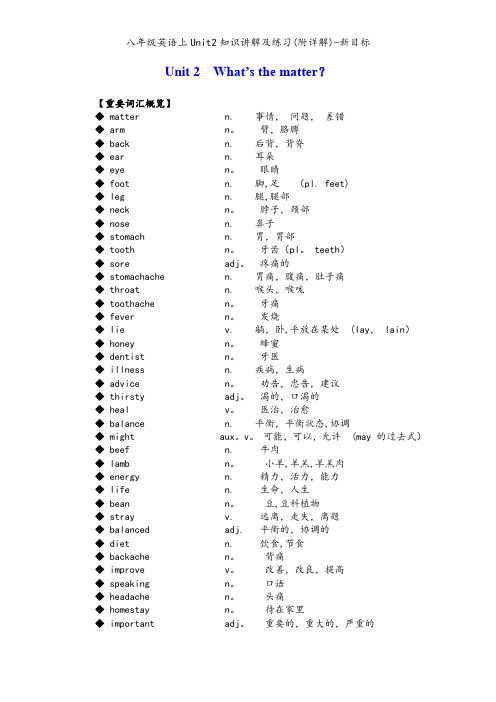
Unit 2 What’s the matter?【重要词汇概览】◆ matter n. 事情,问题,差错◆ arm n。
臂,胳膊◆ back n. 后背,背脊◆ ear n. 耳朵◆ eye n。
眼睛◆ foot n. 脚,足(pl. feet)◆ leg n. 腿,腿部◆ neck n。
脖子,颈部◆ nose n. 鼻子◆ stomach n. 胃,胃部◆ tooth n。
牙齿(pl。
teeth)◆ sore adj。
疼痛的◆ stomachache n. 胃痛,腹痛,肚子痛◆ throat n. 喉头,喉咙◆ toothache n。
牙痛◆ fever n。
发烧◆ lie v. 躺,卧,平放在某处(lay, lain)◆ honey n。
蜂蜜◆ dentist n。
牙医◆ illness n. 疾病,生病◆ advice n。
劝告,忠告,建议◆ thirsty adj。
渴的,口渴的◆ heal v。
医治,治愈◆ balance n. 平衡,平衡状态,协调◆ might aux。
v。
可能,可以,允许(may 的过去式)◆ beef n. 牛肉◆ lamb n。
小羊,羊羔,羊羔肉◆ energy n. 精力,活力,能力◆ life n. 生命,人生◆ bean n。
豆,豆科植物◆ stray v. 远离,走失,离题◆ balanced adj. 平衡的,协调的◆ diet n. 饮食,节食◆ backache n。
背痛◆ improve v。
改善,改良,提高◆ speaking n。
口语◆ headache n。
头痛◆ homestay n。
待在家里◆ important adj。
重要的,重大的,严重的【重要词组概览】◆ have a cold 患感冒◆ stressed out 紧张的,有压力的◆ bean sprout 豆芽◆ get tired 感觉疲惫◆ stay healthy 保持健康◆ at the moment 此刻,现在◆ on the other hand 另一方面◆ get a cold 患感冒◆ see a dentist 看牙医◆ go to the party 去参加聚会◆ make sb sick 使某人不舒服(患锁病)◆ have a sore throat 嗓子痛◆ have a fever 发烧,发热◆ have a toothache 牙痛◆ have a backache 背痛◆ have a headache 头痛【语法知识聚焦】看病需要和医生交流,这是英语口语中必不可少的内容。
新目标八年级英语上册unit2语法总结

新目标八年级英语上册unit2语法总结新目标八年级英语上册unit2语法总结Unit2What’sthematter?1.kindof=abit=alittle一点儿(表示程度) e.gI’mkindof/abit/alittleunhealthy.我有点儿不安康。
2.alittle+n.=abitof+n3.should,can,will,would,may,need,must这些情态动词不能加S,没有第三人称单数形式。
4.starttodosth=startdoingsth开头做某事5.wish/hopetodosth Wishsbtodosth(此处wish不能改为hope,没有hopesbtodosth的用法)6.Ihopeso我盼望如此。
否认形式:Ihopenot.我不盼望如此。
7.Ithinkso.否认:Idon’tthinkso.3aAhealthylifestyle,theChineseway8.insomeways在某些方面9.onone’swayto+n在某人去的道路上(onmywaytoschool在我去学校的路上onmywaytosuccess在我通往胜利的道路上)10.inthisway用这种方法e.gInthisway,youcangetgoodgrades.11.abalanceofAandBA和B的平衡12.forexample举个例子13.needtodosth需要做某事e.gIneedtocutmyhair.我需要理发。
Needdoingsth=needtobedone需要被做某事e.gMyhairneedcutting.=Myhairneedtobecut.我的头发需要被剪。
14.sthbepopularwithsbe.gChinesemedicineisnowpopularwithpeopleinwesterncountries.15.I t’s+adj.(形容词)+todosth做某事怎么样e.gIt’seasytohaveahealthylifestyle.It’simportanttohavegoodhabits.16.believe认为e.gIbelieveit’simportanttosleepeighthoursanight.我认为每晚睡八小时很重要。
最新新目标八年级上unit2复习提纲
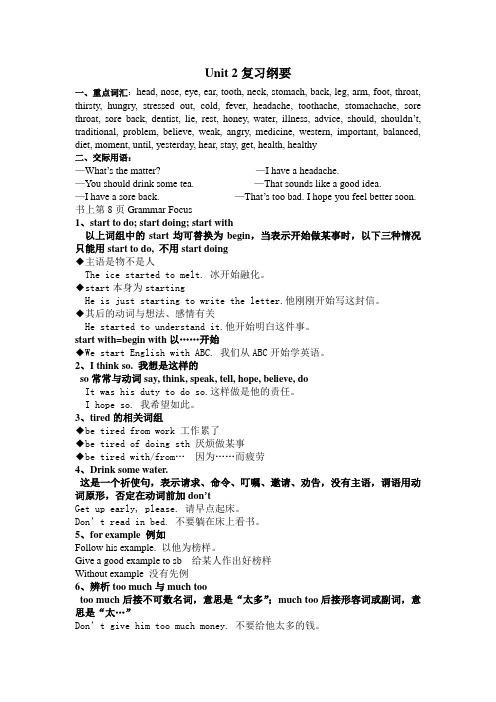
Unit 2复习纲要一、重点词汇:head, nose, eye, ear, tooth, neck, stomach, back, leg, arm, foot, throat, thirsty, hungry, stressed out, cold, fever, headache, toothache, stomachache, sore throat, sore back, dentist, lie, rest, honey, water, illness, advice, should, shouldn’t, traditional, problem, believe, weak, angry, medicine, western, important, balanced, diet, moment, until, yesterday, hear, stay, get, health, healthy二、交际用语:—What’s the matter? —I have a headache.—You should drink some tea. —That sounds like a good idea.—I have a sore back. —That’s too bad. I hope you feel better soon. 书上第8页Grammar Focus1、start to do; start doing; start with以上词组中的start均可替换为begin,当表示开始做某事时,以下三种情况只能用start to do, 不用start doing◆主语是物不是人The ice started to melt. 冰开始融化。
◆start本身为startingHe is just starting to write the letter.他刚刚开始写这封信。
教材知识梳理 八年级(上)Unit 2(含中考试题示例
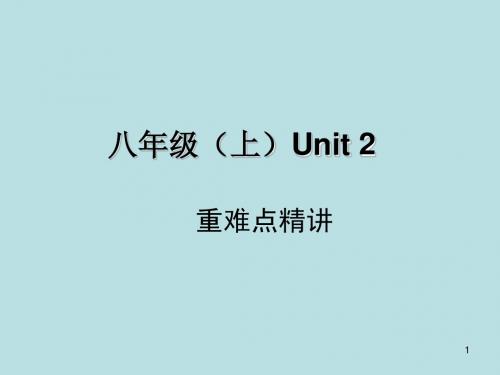
重难点精讲
【现学现用】 5. She really feels like ____a talk with him about C his study at school. A. have B. to have C. having 6. Cotton ____nice and soft. C A. feel like B. feels like C. feels
返回目录
11
重难点精讲
考点5 辨析instead of与instead
两者都有“代替”之意,但用法不同: ◆instead of是介词短语,意为“代替,而不是,相反 ”,其后要接名词、代词、动名词等。如: Wang Lin watched TV instead of playing games l ast night. 昨天晚上王林看电视,没有玩游戏。 ◆instead 是副词,意为 “ 代替,顶替 ” 。通常放在句 末或句首,后面不接其他词。如: Mom, you’re too tired. Let me clean the floor instead. 妈妈,你太累了,我来拖地吧。
八年级(上)Unit 2
重难点精讲
1
考点1 suggest的用法
考点2 enough的用法
考点3 feel like的用法 考点4 worry的用法 考点5 辨析instead of与instead
2
重难点精讲
考点1 suggest的用法
suggest 既可作名词也可作动词,作为名词时,为可 数名词,作为动词时,主要有以下几种用法: ◆suggest“ 建议,提议 ” ,及物动词,后若接动词, 只接动名词,不接不定式。即suggest doing sth. 。 如: He suggests going to the park. 他建议去公园。 ◆suggest“ 建议,提议 ” ,后接 that 引导的宾语从句, 从句要用虚拟的语气,即 “ 主语 +(should) 动词原形 ” , 在美式英语中should可以省略,只用动词原形。如:
8a unit2 school life知识点总结

8AU2 School life单词&词组= have a five-day holiday= have a five days’ holiday3.去看电影go to the movies = go to cinema看电影see a movie/film4.一种混合的酒精饮料 a mixed alcoholic drink5.外语foreign language外国学生foreign students两天后(多用将来) in two days = in two days’ time 两小时之后after two hours两天内within two days刚过完的两天之后two days later7.与某人讨论某事discuss sth with sbn.讨论discussion8.vt.主动提出,资源给予offer为某人提供某物offer sb sth = offer sth to sb 主动提出做某事offer to do sth9.以......结束;以...而告终end up doing sth以某种方式结束end up with以.....结束end with以.....结束;结束于end in10.vt&vi 赢得;赢;获胜win获得第一win the first place= win the first prize=come out first=come first11.只在结束的时间点/表达路的尽头at the end of截止到某时间点(最多不超过那个时间点)by the end of最终、最后in the end = at last = finally 12.至少at least最后但同样重要的last but not least13.远的Far further/farther furthest/farthest14.花时间做某事spend time on sth/(in) doing sth有时间/没时间做某事have some time/no time to do sth 花费某人时间做某事It takes sb some time to do sth15.日常生活daily life16.adj真实的,真的real18.至多,不超过at most至少at least19.浏览,快速查看look through20.起初at first21.继续,重复做某事keep (on) doing sth22.在午餐时间点时间at lunchtime = during lunchtime在夏天段时间in the summertime = in summer 23.半个小时的家庭作业(强调量)have half an hour of homework半小时的午餐时间(强调时间)have half an hour for lunch27.开车送我上学drive me to school/take me to school by car28.因某事钦佩某人admire sb for sth29.需要被.... need doing = need to be done30.n.问题;难题;引起麻烦的人problem难题;难问题difficult problem没问题no problem数学题math problem解决问题solve the problem31.adj.有礼貌的;客气的;优雅的polite对……有礼貌be polite有礼貌的告示;温装提示polite notice礼貌问候语polite greetingadj.没礼貌的;不文雅的impolite辨析:dress, wear, put on, have on 都可表示“穿”,区别如下:句型2.还...? What else... = What other wth...?3.英式英语和美式英语有点不同。
人教版新目标八年级英语上册Unit 2讲义及重点总结
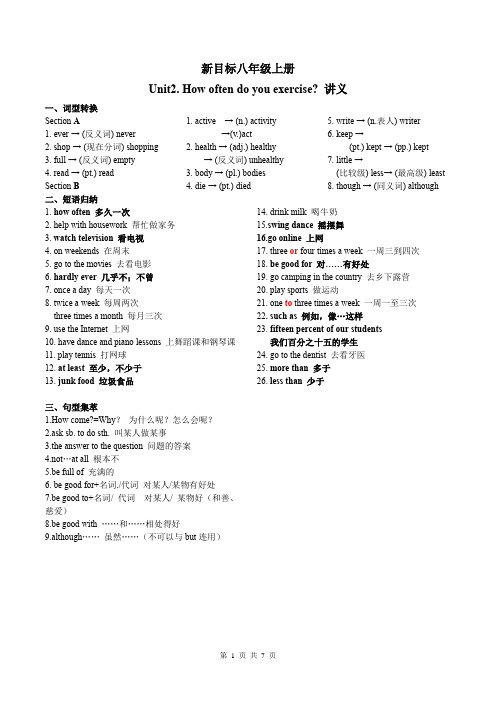
新目标八年级上册Unit2. How often do you exercise? 讲义一、词型转换Section A1. ever → (反义词) never2. shop → (现在分词) shopping3. full → (反义词) empty4. read → (pt.) readSection B 1. active → (n.) activity→(v.)act2. health → (adj.) healthy→ (反义词) unhealthy3. body → (pl.) bodies4. die → (pt.) died5. write → (n.表人) writer6. keep →(pt.) kept → (pp.) kept7. little →(比较级) less→ (最高级) least8. though → (同义词) although二、短语归纳1. how often 多久一次2. help with housework 帮忙做家务3. watch television 看电视4. on weekends 在周末5. go to the movies 去看电影6. hardly ever 几乎不;不曾7. once a day 每天一次8. twice a week 每周两次three times a month 每月三次9. use the Internet 上网10. have dance and piano lessons 上舞蹈课和钢琴课11. play tennis 打网球12. at least 至少,不少于13. junk food 垃圾食品14. drink milk 喝牛奶15.swing dance 摇摆舞16.go online 上网17. three or four times a week 一周三到四次18. be good for 对……有好处19. go camping in the country 去乡下露营20. play sports 做运动21. one to three times a week 一周一至三次22. such as 例如,像…这样23. fifteen percent of our students我们百分之十五的学生24. go to the dentist 去看牙医25. more than 多于26. less than 少于三、句型集萃1.How come?=Why?为什么呢?怎么会呢?2.ask sb. to do sth. 叫某人做某事3.the answer to the question 问题的答案4.not…at all 根本不5.be full of 充满的6. be good for+名词./代词对某人/某物有好处7.be good to+名词/ 代词对某人/ 某物好(和善、慈爱)8.be good with ……和……相处得好9.although……虽然……(不可以与but连用)四、难点讲练1.How often do you exercise?你多久锻炼一次?(1)how often表示“多久一次”。
人教版新目标初中英语八年级上册Unit2知识点汇总
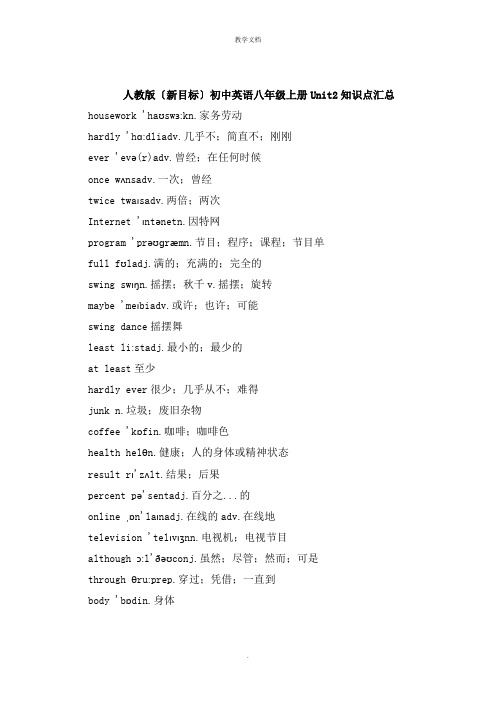
人教版〔新目标〕初中英语八年级上册Unit2知识点汇总housework 'haʊswɜːkn.家务劳动hardly 'hɑːdliadv.几乎不;简直不;刚刚ever 'evə(r)adv.曾经;在任何时候once wʌnsadv.一次;曾经twice twaɪsadv.两倍;两次Internet 'ɪntənetn.因特网program 'prəʊɡræmn.节目;程序;课程;节目单full fʊladj.满的;充满的;完全的swing swɪŋn.摇摆;秋千v.摇摆;旋转maybe 'meɪbiadv.或许;也许;可能swing dance摇摆舞least liːstadj.最小的;最少的at least至少hardly ever很少;几乎从不;难得junk n.垃圾;废旧杂物coffee 'kɒfin.咖啡;咖啡色health helθn.健康;人的身体或精神状态result rɪ'zʌlt.结果;后果percent pə'sentadj.百分之...的online ˌɒn'laɪnadj.在线的adv.在线地television 'telɪvɪʒnn.电视机;电视节目although ɔːl'ðəʊconj.虽然;尽管;然而;可是through θruːprep.穿过;凭借;一直到body 'bɒdin.身体mind maɪnd.头脑;想法;意见;心思such sʌtʃadj.这样的;如此的together tə'ɡeðə(r)adv.共同;一起die daɪv.死;枯竭;消逝writer 'raɪtə(r)n.dentist 'dentɪstn.牙科医生magazine 'mæɡəziːnn.杂志however haʊ'evə(r)adv.然而;无论如何;不管多么than ðənconj.比almost 'ɔːlməʊstadv.几乎;差不多none nʌnpron.没有人;没有任何东西,毫无less lesadj.更少的;较少的point pɔɪntn.看法;要点;重点;小数点;目标;分数such as例如;诸如junk food n.垃圾食品;无营养食品more than超过;多于;不仅仅;非常less than不到;少于Claire克莱尔Sue 苏American Teenager (美国青年少)02Unit2知识梳理(重点短语)1.Clean-Up Day 清洁日2. an old people’s home 养老院3. help out with sth. 援助解决困难4. used to 过去常常......5. care for 关怀;照顾6. the look of joy 愉快的表情7. at the age of 在......岁时8.clean up 清扫(或去除)干净9. cheer up (使)变得更愉快;振奋10. give out 分发;散发11. come up with 想出;提出12. make a plan 制订方案13. make some notices 做些公告牌14. try out 试用;试行15. work for 为…工作;为…. 效力16. put up 建筑;举起;张贴17. hand out 分发;散发;发给18. call up 打 ;召集19. put off 推迟;延迟20. for example 比方;例如21. raise money 筹钱;募捐22. take after 与......相像;像23. give away 赠送;捐赠24. fix up 修理;修补;解决25. be similar to 与……相似26. set up 建立;设立27. disabled people 残疾人28. make a difference 影响;有作用29. be able to 能够30. after-school reading program 课外阅读工程(重点句型)1. The boy could give out food at the food bank.这个男孩可以在食品救济站分发食物。
新目标英语八年级(上)Unit2单元知识要点归纳
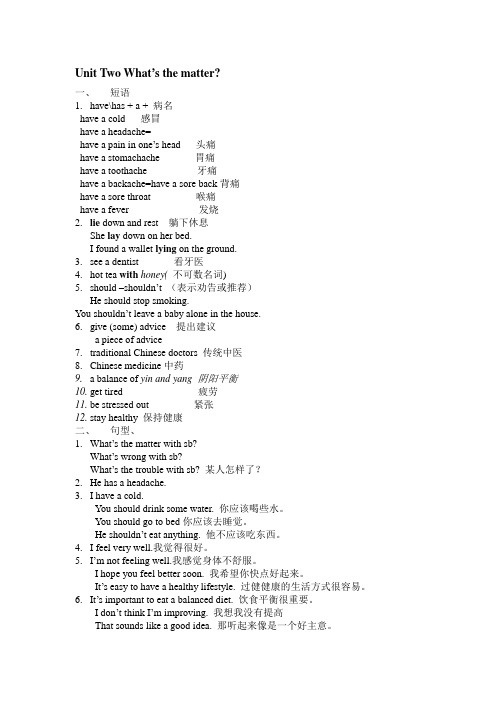
Unit Two What’s the matter?一、短语1.have\has + a + 病名have a cold 感冒have a headache=have a pain in one’s head 头痛have a stomachache 胃痛have a toothache 牙痛have a backache=have a sore back背痛have a sore throat 喉痛have a fever 发烧2.lie down and rest 躺下休息She lay down on her bed.I found a wallet lying on the ground.3.see a dentist 看牙医4.hot tea with honey(不可数名词)5.should –shouldn’t (表示劝告或推荐)He should stop smoking.You shouldn’t leave a baby alone in the house.6.give (some) advice 提出建议a piece of advice7.traditional Chinese doctors 传统中医8.Chinese medicine中药9. a balance of yin and yang 阴阳平衡10.get tired 疲劳11.be stressed out 紧张12.stay healthy 保持健康二、句型、1.What’s the matter with sb?What’s wrong with sb?What’s the trouble with sb? 某人怎样了?2.He has a headache.3.I have a cold.You should drink some water. 你应该喝些水。
You should go to bed你应该去睡觉。
牛津8A Unit2知识点归纳、难点解析、语法复习

8A Unit 2 School life【短语学习重点】P.22-261. why don’t you …=why not…?为什么不……?2. It’s like watching TV.像看电视一样。
3. speak English in both Britain and in America在英国和美国都讲英语a British school --- an American school4. different 不同的单词be different from….tell the differences between A&B find out the differences between A&B5. in Year 8/Grade 8 /in 8th grade 在8年级6. a mixed school 一所混合制学校7. how to cook and sew 如何做饭和缝纫8. I did not know how to do things for myself.= how I can do things for myself9. my favourite subject 我最喜爱的学科10.Home Economics家政学11.cook healthy and tasty meals做健康可口的饭菜12.have a reading week有一个阅读周13. any book 任何书14. bring in sth from home从家里带来某物15. have to do sth 不得不做某事16. near the end of sth /at the end of sth 在---将要/---结束的时候17. talk to/with sb about sth 就某事和某人交谈18. as well也19. have driving lessons in school 上学校开设的驾驶课程20. drive me to school 开车送我去学校drive sb to sp开车送某人去某地21. last year 去年22. twice a week 两周一次once/twice a month一月一次/两次23. spend a lot of time practicing 花大量时间实践与---谈论practice playing softball练习打垒球24. in the Buddy Club 在一个伙伴俱乐部25. learn about 获悉、了解26. have a great time talking度过一段愉快的交谈时间27. a close friend一个亲密的朋友28.with a pleasant taste具有怡人的口味29.tell me more about…告诉我更多有关……talk to sb. about sth跟某人谈论某事30.in 9th grade 在九年级31. read an article by a girl from the USA 看了一篇来自女孩写的文章32. a special friend 一个特别的朋友33. admire sb. very much 非常羡慕某人34. read magazines 看杂志P.27-3135. computer studies电脑学习36. tell funny jokes讲有趣的笑话37. read stories 看小说38. score the most points 得分最高39. plant trees 植树40. the three of us 我们三人41.all the students 所有学生42.a glass of water 一杯水43. online friends 网友44.the same as 和…一样45.different from 和……不同P.32-3746. have 3 days off放三天假47.wear school uniforms 穿校服48.have three Computer Studies lessons 有三节电脑课49.have three Grade 8 classes 有三个8年级班级50.hurt one’s leg 伤了某人的腿51.look out of the window朝窗外看52. move to …搬到…..53.school uniform 校服54. go on a school trip to someplace到…进行一次学校旅行55. join a club加入一个俱乐部56.a big dinning hall 一个大餐厅after-school activities课外活动57.listen to pop music 听流行音乐listen to good music58. on one side…..on the other side在一边….在另一边59. (be) the same size as...和----有相同的尺寸【句型学习】1.Why don’t dogs go to school? 狗为什么不去上学?2.What is school like? It is like watching TV. 学校像什么样子呢?它就像看电视。
八上Unit2知识总结
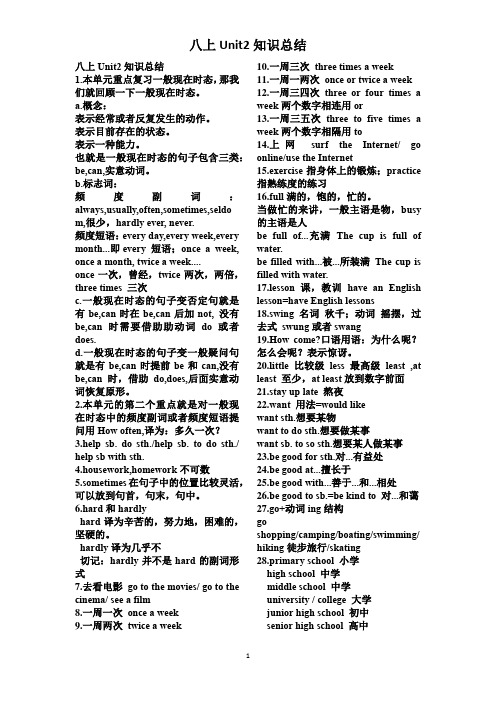
八上Unit2知识总结1.本单元重点复习一般现在时态,那我们就回顾一下一般现在时态。
a.概念:表示经常或者反复发生的动作。
表示目前存在的状态。
表示一种能力。
也就是一般现在时态的句子包含三类:be,can,实意动词。
b.标志词:频度副词:always,usually,often,sometimes,seldo m,很少,hardly ever, never.频度短语:every day,every week,every month...即every 短语;once a week, once a month, twice a week....once一次,曾经,twice两次,两倍,three times 三次c.一般现在时态的句子变否定句就是有be,can时在be,can后加not, 没有be,can时需要借助助动词do或者does.d.一般现在时态的句子变一般疑问句就是有be,can时提前be和can,没有be,can 时,借助do,does,后面实意动词恢复原形。
2.本单元的第二个重点就是对一般现在时态中的频度副词或者频度短语提问用How often,译为:多久一次?3.help sb. do sth./help sb. to do sth./ help sb with sth.4.housework,homework不可数5.sometimes在句子中的位置比较灵活,可以放到句首,句末,句中。
6.hard和hardlyhard译为辛苦的,努力地,困难的,坚硬的。
hardly译为几乎不切记:hardly并不是hard的副词形式7.去看电影go to the movies/ go to the cinema/ see a film8.一周一次once a week9.一周两次twice a week 10.一周三次three times a week11.一周一两次once or twice a week12.一周三四次three or four times a week两个数字相连用or13.一周三五次three to five times a week两个数字相隔用to14.上网surf the Internet/ go online/use the Internet15.exercise指身体上的锻炼;practice 指熟练度的练习16.full满的,饱的,忙的。
牛津初中英语8A Unit2知识点整理

8A Unit2 知识点整理1. 不得不更努力地工作have to work harder2. 一所理想学校an ideal school3. 英式英语British English美式英语American English4. 有一场重要比赛have an important match5. 在八年级in Year 8=in Grade 8=in the 8th grade6. 在一所男女混合学校in/at a mixed school7. 一起上课have lessons together8. 从学校图书馆借书borrow books from the school library9. 从家里把书和杂志带过来bring in books and magazines from home10. 在这周临近结束时near the end of this week在这周结束时at the end of this week11. 和我们的同学讨论那些书discuss the books with our classmates12. 在课堂上in class在班级里in the class13. 看英文录像watch English videos14. 仔细倾听我的问题listen carefully to my problem15. .给我提供帮助offer me help=offer help to me主动提出做某事offer to do sth.16. 由一个男孩写的一篇文章an article by a boy一部冯小刚拍的影片 a film by Feng Xiaogang一首周杰伦唱的歌 a song by Jay Chou17. 有不同的课have different classes18. 一起做运动do sports together19. 每次刻苦练习practice hard every time20. 赢两场比赛win two games/matches打败某人beat sb.21.有一个阅读周have a Reading Week22.。
八年级上册Unit2知识点归纳

八年级上册Unit2知识点归纳八年级上册的Unit2主要涵盖了一些英语语法和词汇知识,包括时态、动词不定式、情态动词、名词和形容词等方面。
下文将对这些知识点进行归纳总结,以帮助学生更好地掌握这些重要的英语知识点。
1. 时态在Unit2中,时态是一个重要的语法知识点。
本单元重点介绍了现在进行时和一般现在时两种时态。
一般现在时(Simple Present Tense):表示现在或经常性的习惯性动作。
例如:- I usually go to school by bike.(我通常骑自行车去学校。
)- He often reads books in the library.(他经常在图书馆里看书。
)现在进行时(Present Continuous Tense):表示现在正在进行的动作。
例如:- She is watching TV now.(她现在正在看电视。
)- What are you doing?(你在做什么?)2. 动词不定式动词不定式(Infinitive)是一个非常常见的语法知识点,也是本单元的重点。
动词不定式用来表示目的、意愿、建议和能力等。
例如:- I want to go to the movies.(我想去看电影。
)- He can speak Chinese very well.(他可以很好地说中文。
)需要注意的是,动词不定式有时需要加上to或省略to,具体要根据上下文和语境进行判断。
3. 情态动词情态动词(Modal Verbs)是指can、may、must、shall、will等一系列动词,用来表达说话人的态度或能力。
在Unit2中,重点介绍了can、may、must和should这四个情态动词。
can:表示能力。
例如:- We can swim in the river.(我们可以在河里游泳。
)may:表示可能性。
例如:- It may rain tomorrow.(明天可能会下雨。
新目标英语八年级(上)Unit2知识要点归纳

互动课堂知识要点归纳新目标英语八年级(上)【重点词组或短语】1.how often多久一次2.of course当然3.on weekends在周末4.go to the movies去看电影5.hardly ever几乎不;不曾6.at least至少,起码7.junk food垃圾食品e the Internet上网9.three or four times a week一周三到四次10.want sb.to do sth.想要某人做某事11.be good/bad for对……有好/坏处12.go camping in the country去乡下露营. All Rights Reserved.13.play sports做运动14.one to three times a week一周一到三次15.such as例如16.fifteen percent of our students我们百分之十五的学生17.go to the dentist去看牙医18.more than多于19.less than少于【重难点句子】1.How often do you exercise?你多久锻炼一次?2.—What do you usually do on weekends?———你周末通常做什么?—我通常踢足球。
—I usually play soccer.——3.She says it’s good for my health.她说这对我的健康有好处。
4.How many hours do you sleep every night?你每晚睡几个小时?5.And twenty percent do not exercise at all!百分之二十的人根本不锻炼!6.The answers to our questions about watching television were also interesting.我们对看电视这个问题的答案也是十分有趣。
新目标八年级上册英语 Unit2 复习
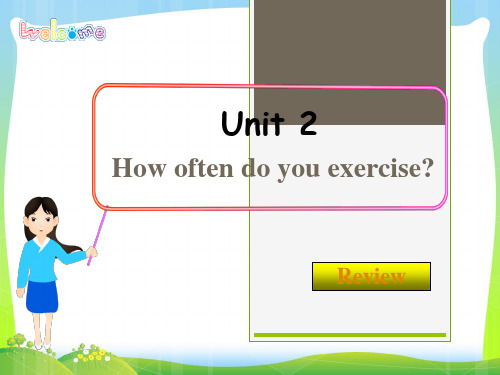
Jay Chou is a famous Chinese pop singer. He usually starts the day with breakfast. He often has eggs for breakfast. He practice singing every day because he loves music and his fans love his songs very much. He likes eating vegetables. He usually exercises in the afternoon.
Look and imagine what his or her lifestyle is like. Try to use some of the words below:
often ,every day , usually ,once a week sometimes , always, never , three times a week, hardly ever…
3.How long… 多久… How long can I keep this dictionary? 我能借这字典多久?
You can keep it for three weeks. How soon… 多久(之后)… How soon will your father come back?
He got up early every day last year. How often did he get up early last year? 相当于How many times…..+时间段….. How many times a week do you do sports? 2.How far… 多远… How far is it from your home to the zoo? 从你家到动物园有多远.
八年级上英语unit2知识点
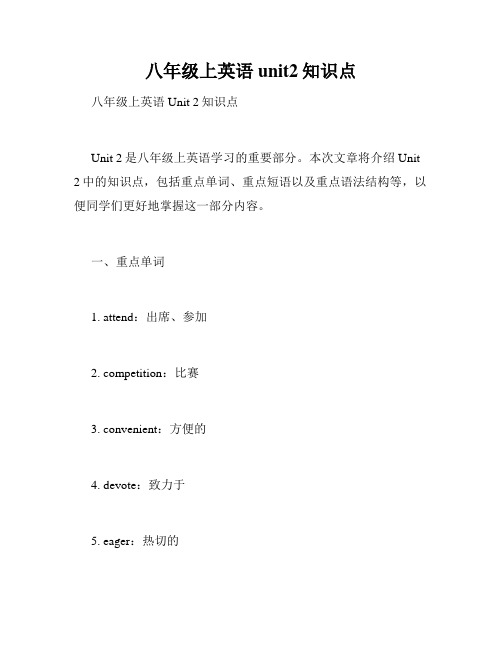
八年级上英语unit2知识点八年级上英语Unit 2知识点Unit 2是八年级上英语学习的重要部分。
本次文章将介绍Unit 2中的知识点,包括重点单词、重点短语以及重点语法结构等,以便同学们更好地掌握这一部分内容。
一、重点单词1. attend:出席、参加2. competition:比赛3. convenient:方便的4. devote:致力于5. eager:热切的6. encourage:鼓励7. explore:探索8. impress:给某人留下深刻印象9. involve:涉及、包含10. examine:检查、审查11. memorial:纪念碑12. memorize:记忆13. permit:允许14. persuade:说服15. publish:出版、发表二、重点短语1. take part in:参加2. devote oneself to:致力于3. be eager to:渴望4. be impressed by:被……所震撼5. have an influence on:对……有影响6. be involved in:涉及、参与7. be permitted to:被允许8. persuade sb. to do sth.:说服某人做某事9. publish sth. in:在……发表某事10. explore the world:探索世界三、重点语法结构1. 过去完成时过去完成时表示在过去某个时间或某个动作发生之前已经完成的动作,其结构为had + 过去分词。
例:By the time I got to the station, the train had already left.2. 祈使句祈使句通常用于表示命令、请求、建议等,其结构为动词原形+ 其他。
例:Please sit down and be quiet.3. 现在进行时现在进行时表示现在正在进行的动作,其结构为am/is/are + 现在分词。
2019-2020年人教新目标八年级上学期Unit2知识归纳手册

2019-2020学年人教新目标八年级上学期Unit2知识归纳手册第一节:重点词组1.去看电影go to the movies2.多久一次how often3.几乎从不hardly ever4.在周末 on the weekend/on weekends5.一周一次once a week6.一周两次twice a week7.一个月三次 three times a month8.使用互联网 use the internet9.充满… be full of 10.上钢琴课have piano lessons11.不得不做某事have to do sth.12.帮助做家务help with housework13.至少at least 14.至多at most15.保持健康keep healthy/keep in good health 16….的结果the result of…17.百分之二十twenty percent18.对…有益be good for…19.对…有害be bad for20.垃圾食品junk food21.多少个小时how many hours22.做运动play/do sports23.在某人空闲时间in one’s free time24.根本不;一点也不not…at all25.询问…关于…ask…about26.熬夜stay up late27.一个16岁的男孩 a 16-year-old boy28.超过、多于more than29.少于less than30.放松的最好方式the best way to relax第二节:重点语法解析频度副词含义:表示事情发生频率的副词称为频度副词。
(1)常用的频度副词有always(总是),usually(通常),often(经常),sometimes(有时),seldom(很少),hardly ever(几乎从不),never(从不)等。
英语新目标八年级上册二单元知识归纳.doc
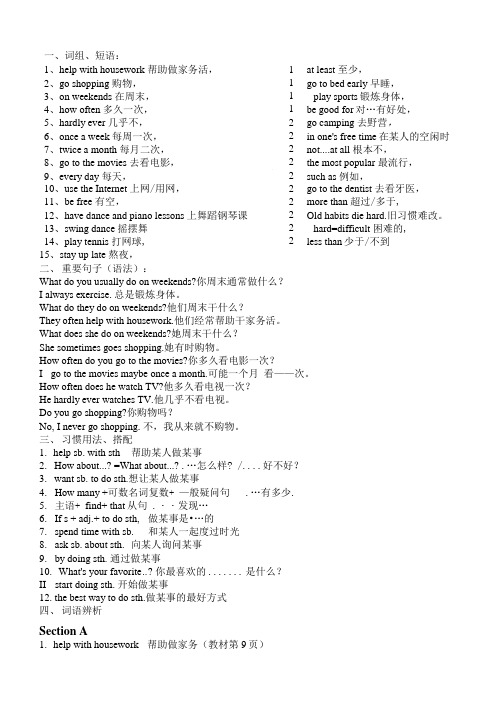
一、词组、短语:1、help with housework 帮助做家务活,16、at least 至少,2、go shopping 购物,17、go to bed early 早睡,3、on weekends 在周末,18、play sports锻炼身体,4、how often 多久一次,19、be good for对…有好处,5、hardly ever 几乎不,20、go camping 去野营,6、once a week 每周一次,21、in one's free time在某人的空闲时7、twice a month 每月二次,22、not....at all 根本不,8、go to the movies 去看电影,23、the most popular 最流行,9、every day 每天,24、such as 例如,10、use the Internet 上网/用网,25、go to the dentist 去看牙医,11、be free 有空,26、more than 超过/多于,12、have dance and piano lessons 上舞蹈钢琴课27、Old habits die hard.旧习惯难改。
13、swing dance 摇摆舞28、hard=difficult 困难的,14、play tennis 打网球,29、less than少于/不到15、stay up late 熬夜,二、重要句子(语法):What do you usually do on weekends?你周末通常做什么?I always exercise.总是锻炼身体。
What do they do on weekends?他们周末干什么?They often help with housework.他们经常帮助干家务活。
What does she do on weekends?她周末干什么?She sometimes goes shopping.她有时购物。
八年级英语上册“Unit 2”必背知识点

八年级英语上册Unit 2 How often do you exercie?必背知识点一、词汇短语1. help with housework:帮助做家务2. go shopping:购物3. on weekends/at weekends:在周末4. how often:多久一次5. hardly ever:几乎不6. once a week/month:每周/月一次7. twice a week/month:每周/月两次8. go to the movies:去看电影9. every day:每天10. use the internet:上网/用网11. be free:有空12. have dance and piano lessons:上舞蹈和钢琴课13. swing dance:摇摆舞14. play tennis:打网球15. stay up late:熬夜16. at least:至少17. go to bed early:早睡18. play sports:锻炼身体19. be good for:对……有好处20. go camping:去野营21. in one’s free time:在某人的空闲时间22. not…at all:根本不23. the most popular:最流行24. such as:例如25. go to the dentist:去看牙医26. old habits die hard:旧习惯难改27. less than:少于/不到二、语法结构1. 频率副词:always, usually, often, sometimes, never 等,用于描述动作发生的频率。
2. “次数”的表达方法:一次once,两次twice,三次或三次以上用基数词+times,如three times,five times。
3. how often 引导的特殊疑问句:用于询问动作发生的频率,回答常含有频率词组或短语。
人教新目标八年级英语上册Unit 2 How often do you exercise?知识点归纳

人教新目标八年级英语上册Unit 2 How often do you exercise?知识点归纳第1课时 Section A(1a2d)exercise v. & n. 锻炼,练习housework n. 家务劳动,家务事sometimes adv. 有时never adv. 从不,绝不once adv. 一次,曾经。
频度副词,与之类似的词还有:twice 两次;three times 三次……program n. 节目full adj. 忙的,满的,充满的。
常用于短语:be full of 充满……,可与be filled with互换【拓展】(1)exercise相关用法·exercise意为“锻炼,运动”时是不可数名词。
如:take exercise。
·exercise意为“操”时是可数名词。
如:do morning exercises。
·exercise意为“练习,习题”时是可数名词。
如:do exercises。
(2)sometime, sometimes, some time和some times用法辨析·sometime adv. 某个时候。
可指过去或将来的某个时候。
·sometimes adv. 有时。
at times也是“有时”的意思。
·some time 某段时间。
常与for连用。
·some times 几次。
相当于several times。
(3)与once相关的短语有:at once 立即,马上;once again 再一次;once in a while 偶尔地。
how often多久一次on weekends在周末help with帮助做家务houseworkhardly ever几乎从不once a week每周一次【拓展】(1)特殊疑问句中与how相关的疑问词组的用法·how often 多久一次。
- 1、下载文档前请自行甄别文档内容的完整性,平台不提供额外的编辑、内容补充、找答案等附加服务。
- 2、"仅部分预览"的文档,不可在线预览部分如存在完整性等问题,可反馈申请退款(可完整预览的文档不适用该条件!)。
- 3、如文档侵犯您的权益,请联系客服反馈,我们会尽快为您处理(人工客服工作时间:9:00-18:30)。
新目标八年级上学期(8A)英语Unit2课本知识复习整理Unit 2 What's the matter?【知识梳理】I. 重点短语 1. have/ catch a cold=have got a cold 感冒2.a sore back/throat 背(咽喉)痛3. have a stomachache 胃痛4. lie down and rest 躺下休息5. see a dentist 看牙医6. drink lots of water 多喝水7. hot tea with honey 加蜂蜜的热茶8. a good idea 好主意.9. stressed out 筋疲力尽10. a healthy lifestyle 健康的生活方式11. traditional Chinese doctors 传统中医医生12. a balance of yin and yang 阴阳调和13. too much yin 阴气太盛14. a balanced diet 饮食平衡15. healthy/yin/yang food 健康(阴性,阳性)食品16. at the moment = now 此刻17. enjoy oneself = have a good time =have fun=have a wonderful time 玩得高兴,过得愉快19. host family 寄宿家庭20. conversation practice 会话练习21. enjoy doing sth. 喜欢做某事,II. 重要句型 1.like doing sth 喜欢做某事,2. practise doing sth. 练习做某事,3. mind doing sth. 介意做某事,4. finish doing sth. 完成某事,5. give up doing sth. 放弃做某事,6. keep doing sth. 坚持做某事.7.can’t stand doing sth.忍不住做某事8. have fun doing sth. 做某事很愉快即:practice, mind, finish, give up, keep, can’t stand, havefun等与enjoy用法相似。
III. 交际用语询问别人如何感觉A: What's the matter?(怎么了?)B: I'm not feeling well.(我感觉不舒服。
)I have a cold.(我感冒了。
)A: When did it start?(什么时候开始的?)B: About two days ago.(大约两天前开始的。
)A: Oh, that's too bad.(哦,这很糟糕。
)You should lie down and rest.(你应该躺下休息。
)B: Yes, I think so.(是的,我是这么认为的。
)A: I hope you feel better soon.(祝你早日康复。
)IV. 重要语法情态动词【课文解析】You must do the work with more care.你工作要再细心些。
Maybe与may bemaybe连在一起是副词,意为“可能,也许,大概”,在句中作状语,通常置于句首,也可以放在谓语动词之前;may be分写是“情态动词+动词原形”的形式,在旬中作谓语。
一Is that true?那是真的吗?一Maybe,I'm not sure.也许(可能)是,我说不准。
He may be eighteen.他可能18岁了。
Maybe your book is at home.也许你的书在家里。
The book may be in the desk.那本书可能在课桌里。
I am not feeling well.我觉得不舒服。
I'm not feeling well.是病人回答医生或回答他人询问病情时常用的回答方式之一,意为“我感到不舒服”。
I am not feeling well也可以说成I don't feel well8类似的答语还有:I feel terrible.我感到不舒服。
I feel m.我感觉生病了。
I feel even worse.我感到更糟糕了。
feel在该句中为系动词,意为“觉得,感觉”。
He feels comfortable.他觉得很舒服。
I feel cold/hungry.我感到9/觉得饿。
start to do和start doing都表示“开始做某事”,但是在以下三种情况中用start to do而不用start doing。
(1)主语是物而不是人时。
The ice started幻melt.冰开始融化了。
(2)start本身为-ing形式时。
He is just starting to write the letter.他刚刚开始写那封信。
(3)其后的动词与想法、感情有关时。
She started to understand it.她开始明白这件事。
That's too bad.是人们对于对方或者自己的不幸、不理想的结果抱有可惜的一种感情流露,意为“太可惜(糟糕,不幸)了。
”通常用于口语中。
That's too bad.I can't catch the train.I have to go there tomorrow.太糟糕了,我赶不上火车了,我只好明天去那里了。
一I failed the exam again this time.这次考试我又没及格。
—That's too bad.You should work harder at your lessons.真可惜,你应当更加努力地学习功课。
so常常与动词、形容词等连用,以避免重复。
常用的动词有say,speak,tell,hope,believe,do等;形容词有afraid 等。
一I failed the math exam.Really?我数学考试没有及格,真的吗?一I'm afraid so.恐怕是这样。
其形容词是ill(病的,生病的),其反义词是health(健康)。
illnesses of children儿童所得的各种疾病Some children are away from school because of illness.一些孩子因病不能来上学。
advice是名词,表示“建议”,属不可数名词。
Please give us some advice.请给我们出些主意。
She gave me some advice on how to learn English.她向我提出了如何学习英语的建议。
take sb.’s advice接受某人的建议ask for sb.’s advice征求某人的意见healthy与health二者词性不同,因此用法就不同。
(1)health为名词,意为“健康(状态)”,其反义词是i11ness。
通常作宾语。
She is in good health.她身体健康。
Drinking milk is good for your health.喝牛奶有益于你的身体健康。
(2)healthy是形容词,意为“健康的”,其反义词是unhealthy。
在句中作定语或表语。
My wife had a healthy baby just now.我太太刚生了个健康的宝宝。
Too much,much too与too many三者均是含有副词too的短语,但其用法不同。
(1)too much和much too样子很相似,但是用法不同。
Too much后接不可数名词,意为“太多”;much too后跟形容词或副词,意为“太……”。
There is too much noise in the classroom.教室里太吵。
The book is much too dear.这本书太贵。
(2)too many的中心词是many,too’是修饰语,因此该短语是形容词短语,常用来修饰名词复数。
There are too many old books in the library.图书馆里旧书太多。
Also, too与either三者都表示“也”。
但是用法有区别。
(1)too用于肯定句,置于旬末,前面加逗号;也可以用在句中,前后都加逗号。
(2)also含较庄重的色彩,通常置于be等助动词后,实义动词前。
He likes English,too.=He,too,likes English.他也喜欢英语。
She is rich,and she is also selfish.她很富有,也很自私。
She also learns English.她也学英语。
(3)either用于否定句,置于句末,并用逗号隔开。
He is not there,either.他也不在那儿。
For example 与like(1)for example意为“例如”,作插入语,用逗号与句子隔开,可置于句首、句中或句末。
Tom is a good bey.For example.he often helps Granny Li do housework.汤姆是个好男孩。
比如他常帮李奶奶做家务。
(2)like也常用作举例,但其后常接名词或代词。
Some warm-blooded animals,like the cat and the dog,don't need to hibernate.一些温血动物,像猫和狗,不需要冬眠。
Eating Dangshen and Huangqi herbs is alos good for this.吃党参和黄芪也对此有好处。
此句中的Eating Dangshen and Huangqi herbs作主语,是动名词短语,谓语动词需要用第三人称单数形式,故be动词用is。
stressed out是一个形容词短语,此处作表语。
stressed由动词stress而来,它是8tress的过去分词,stress意为“加压力”。
在英语中,有部分动词的过去分词已演变为形容词,常见的如:interest(使……感兴趣) interested,worry(担忧) wortied,relax(放松)relaxed,excite(使……兴奋)--~excited,lose(丢失)---,lost,amazing(使……惊奇)--,amazed。
这类形容词往往用来说明人的情绪。
We are relaxed on weekends.周末我们可以放松一下。
